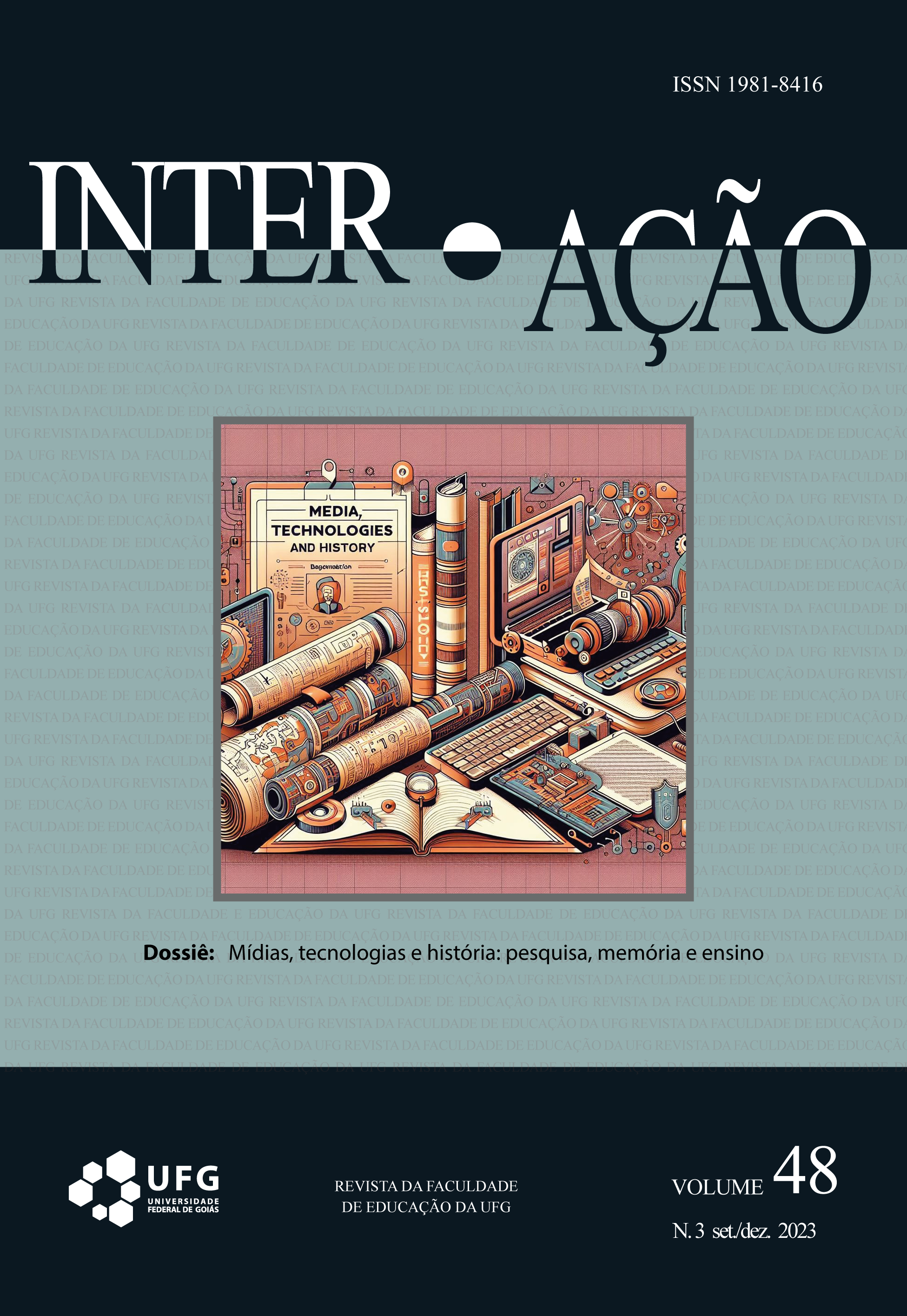EDUCATION AS HUMAN FORMATION: AUTONOMY, HOPE AND ICTs
DOI:
https://doi.org/10.5216/ia.v48i3.75495Abstract
This article launches itself on the following question: how do autonomy, hope and TDIC's contribute to the process of education as a human formation? This launch is made from Paulo Freire, in his works "Pedagogy of Autonomy" and "Pedagogy of Hope". This author introduces himself as an educator who, when thinking about the human being, society and their relationships, was engaged in debating education thinking about how to be able to transform it existentially from a praxis engaged in the face of the commitment and participation of all. , from the perspective of a liberating education that can cooperate so that the student becomes the subject of his own development, via the construction of autonomy and the action of hope. When working with the triad autonomy-hope-TDIC's (Digital Technologies of Information and Communication) it was possible to make some considerations, the most important being that the future is disputed in the present, so the democratic, progressive, technological, and humanized education that we aim for the future is built in the present.
KEYWORDS: Technology; Pedagogy; Praxis; Progressive Education.
Downloads
References
BARROS, F. B. M. Educação digital humanizada e metodologia da problematização na agenda educação 2030. In: LÓPEZ-GARCÍA, C.; MANSO, J. (Eds.). Transforming education for a changing world. Eindhoven, NL: Adaya Press, 2018, p. 203-211.
BARROS, M. G.; CARVALHO, A. B. G. As concepções de interatividade nos ambientes virtuais de aprendizagem. In: Tecnologias digitais na educação. Orgs. SOUSA, R. P.; MIOTA, F. M. C. S. C.; and CARVALHO, A. B. G. Campina Grande: EDUEPB, 2011.
FREIRE, Paulo. A Pedagogia do Oprimido. Rio de Janeiro: Paz e Terra, 1987.
FREIRE, Paulo. Pedagogia da Autonomia: Saberes necessários à prática educativa. São Paulo. Paz e Terra, 1996.
FREIRE, Paulo. Pedagogia da Esperança. Editora Paz e Terra, S.A. São Paulo, 1997.
FREIRE, Paulo. Professora sim, tia não: Cartas a quem ousa ensinar. São Paulo: Olho d’Água, 1997.
FREIRE, Paulo. Educação e mudança. 30ª ed.; Rio de Janeiro: Paz e Terra, 2007.
JARDIM, L. A.; CECÍLIO, W.W.G. Tecnologias educacionais: aspectos positivos e negativos em sala de aula. XI Congresso Nacional de Educação. Pontifícia Universidade Católica do Paraná. Curitiba, 2013.
LIBÂNEO, J. C. Que Destino os Educadores Darão à Pedagogia? In: PIMENTA. S. G. (Org.). Pedagogia, Ciência da Educação? São Paulo: Cortez, 1996.
LIMA, L. C. Aprender para ganhar, conhecer para competir: sobre a subordinação da educação na “sociedade da aprendizagem”. São Paulo: Cortez, 2012.
LIMA, L. C. Organização escolar e democracia radical: Paulo Freire e a governação democrática da escola pública. São Paulo: Cortez, 2013.
MELO, F. S. O Uso das Tecnologias Digitais na Prática Pedagógica: Inovando Pedagogicamente na Sala de Aula. Dissertação (Mestrado) – Universidade Federal de Pernambuco, CE. Programa de Pós-graduação em Educação Matemática e Tecnológica. Recife, 2015. Disponível em: https://repositorio.ufpe.br/handle/123456789/22533. Acesso em: 21 nov. 2023.
MORAN, M. J.; MASETTO, M.; BEHRENS, M. Novas Tecnologias e Mediação Pedagógica. 16 ed. Campinas: Papirus, 2009, p. 12-17.
MÜHL, E. H. “Habermas e a educação: racionalidade comunicativa, diagnóstico crítico e emancipação”. Educação e Sociedade, Campinas (SP), v. 32, n. 117, p. 1035-1050, out.-dez. 2011. Disponível em: https://www.scielo.br/j/es/a/6VrZDR498DDdjP8ZRdnqrWy/?lang=pt. Acesso em: 21 nov. 2023.
NETO, J.A.A. Poema “Pedagogia do Oprimido – Paulo Freire”. Site do Frei Gilvander Moreira. 25 de novembro de 2020. Disponível em: https://gilvander.org.br/site/%EF%BB%BFpoema-pedagogia-do-oprimido-paulo-freire-de-joao-adonias-aguiar-neto/. Acesso em: 21 nov. 2023.
OLIVEIRA, F. M. Tendências Pedagógicas Progressistas Brasileiras: Concepções e Práticas. Mestrado em estudos profissionais especializados em educação: especialização em administração das organizações educativas. Politécnico do Porto, dez. 2020. Disponível em: https://recipp.ipp.pt/handle/10400.22/10743. Acesso em: 21 nov. 2023.
PAVAN, R. A necessidade de redizer e reviver a pedagogia da esperança de Paulo Freire. Revista e-Curriculum, São Paulo, v. 16, n. 4, 2018. Disponível em: https://doi.org/10.23925/1809-3876.2018v16i4p1437-1456. Acesso em: 21 nov. 2023.
SAVIANI, D. Sentido da Pedagogia e papel do pedagogo. São Paulo: Cortez, 1985.
SAVIANI, D. Escola e Democracia. 34 ed. rev. Campinas, Autores Associados, 2001. (Col. Polêmicas do Nosso Tempo; vol. 5).
SAVIANI, D.; DUARTE, N. A formação humana na perspectiva histórico-ontológica. Revista Brasileira de Educação, Rio de Janeiro, v. 15 n. 45 set./dez. 2010. Disponível em: https://doi.org/10.1590/S1413-24782010000300002. Acesso em: 21 nov. 2023.
WECK, J. D.; CABRAL, C. G.; ANDRADE, A. F. Reflexões sobre o uso das tecnologias digitais na perspectiva de humanização da tecnologia. Prometeu, Natal (RN), ano4, n. 4, 2018, p. 1-17. Disponível em: https://periodicos.ufrn.br/revprometeu/article/view/25663. Acesso em: 21 nov. 2023.
Published
How to Cite
Issue
Section
License
Copyright (c) 2023 Everton Nery Carneiro, Elisangela Carvalho Barbosa de Brito Marques, Diná Santana de Novais, Franciele Nascimento dos Santos

This work is licensed under a Creative Commons Attribution-NonCommercial 4.0 International License.
Inter-Ação uses the Creative Commons Attribution 4.0 License for Open Access Journals (Open Archives Initiative - OAI) as the basis for the transfer of rights. Open access means making documents available on the Internet free of charge, so that users can read, download, copy, distribute, print, search, or link to the full text of documents, process them for indexing, use them as input data for software programs, or use them for any other lawful purpose, without financial, legal, or technical barriers.
Authors publishing in this journal agree to the following conditions:
1) Authors retain copyright and grant the journal the right of first publication, with the work simultaneously licensed under the Creative Commons Attribution License, which permits redistribution of the work with attribution and first publication in this journal.
2) Authors are permitted to enter into additional, separate agreements for non-exclusive distribution of the version of the work published in this journal (e.g., for publication in an institutional repository or as a book chapter), with attribution and first publication in this journal.
3) Authors are permitted and encouraged to publish and distribute their work online (e.g. in institutional repositories or on their home page) at any time before or during the editorial process, as this may generate productive changes as well as increase the impact and citation of the published work.















